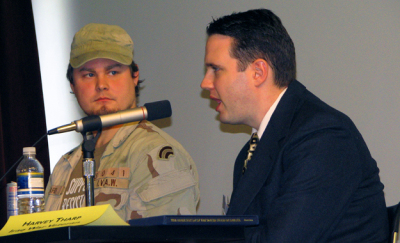Now Playing: Stacy Bannerman
Topic: Members Speak Out
No Deals for Democrats: Quit Bargaining with the Lives of Our Loved Ones
Published on Sunday, March 5, 2006 by Stacy Bannerman
It’s easy to make deals with soldiers’ lives when it’s not your soldier. It’s pretty simple to postpone coming up with an exit strategy when your loved ones are already home.
What’s not so easy is sitting across from a familiar stranger, someone who looks like your loved one, but isn’t, not quite. What’s even harder is dining next to an empty chair, day after day, month after month, and year after year. Taking your meals at the bedside of what’s left of your son lying in intensive care at Walter Reed Army Medical Center is a whole different degree of difficult.
Diane Benson’s 26-year-old boy was still unconscious when he arrived at Walter Reed after being hit by a roadside bomb in Tikrit, north of Baghdad. Latseen Benson, in the 101st Airborne, had his legs blown off, along with part of an arm. If he survives—and it’s still a pretty big if—he will never again sit in his old chair at his mother’s table. Negotiate that, Senator Clinton.
Anne Roesler’s son just returned from his third deployment to Iraq in three years. Before he left in August, he told his mom that, if he made it back this time, it would take years for him to recover. Iraq War veterans are already exhibiting post-combat mental health challenges at unprecedented levels.
Part of the reason for the escalating psychological problems is that while soldiers were typically sent for one tour-of-duty in Vietnam, more and more troops are serving two, three, and sometimes four rotations in Iraq. Another complication is the moral ambiguity of fighting a war without front lines, and where the combatants are, or are dressed as, civilians, some of them women or teens. Iraqi law allows the use of children as soldiers, and at least 1,000 youths are believed to be serving in the Iraq military, a figure that doesn’t account for the adolescents providing assistance to insurgency forces.
There is considerable psychological distress associated with going into a country under the auspices of liberating and helping a people, only to have those people rise up against you, and it lingers long after the war has ended.
This nation’s leaders told our soldiers that the people of Iraq would be overjoyed to see them. Forty-five percent of Iraqis think that the insurgents’ attacks on American troops are justified. Eighty percent of Iraqis want the troops out now, as do a majority of Americans.
When this administration sent my husband to Iraq, they told him he’d be building schools. Instead, he killed schoolchildren. Now, how is he supposed to deal with that? How does the wife deal with being woken up in the middle of the night by her husband, holding an imaginary gun to her head?
The only deals that interest politicians are the ones that will keep them in office. They speak of “phased withdrawals,” a gradual drawing-down of forces, which has been tried before.
It didn’t work in Vietnam. It’s sheer arrogance or stupidity to think it will succeed in Iraq.
Senator Hillary Clinton (D-NY) said an immediate pullout “would cause more problems for us in America." Does “us” refer to you folks on Capitol Hill? What about the nearly 70 percent of Americans who want the troops out of Iraq? Or do you mean the soldiers who are serving in Iraq, and the families left behind? Because, I assure you, the problem for “us” is not an immediate withdrawal of troops.
The problem, for those of us with loved ones in uniform, is that our soldiers are fighting and dying for a lie.
Bargaining with the lives of our soldiers is not leadership. It is moral cowardice and an egregious failure of office of the highest order. I’ve come to expect that from the Bush administration, but surely the Democrats can do better. With the exception of Rep. John Murtha (D-PA), too many Democrats are trying to make deals with the lives of our soldiers. Democratic National Committee Chairman Howard Dean recently endorsed a report by former assistant Defense secretary Lawrence Korb. The ‘strategic redeployment’ concept sets out a plan for a phased troop withdrawal over an 18 month period.
Senator Joe Biden (D-DE) recently stated that he thinks: “In 2006, American troops will begin to leave Iraq in large numbers. By the end of the year, I believe we will have redeployed at least 50,000 troops."
But Biden, Dean, and far too many other Democrats are remarkably silent about the 80,000 or more troops that would remain in Iraq. And they’re mute when it comes to the 800-plus soldiers who will most likely get killed between now and then, bringing the U.S. body count to around 3,000. That’s playing Russian roulette with our loved ones. If the Democratic leaders don’t play that game with their families, they’ve got no right to play it with ours.
Stacy Bannerman is a contributor to Foreign Policy In Focus and on the Advisory Board of Military Families Speak Out. Her book “When the War Came Home: The Inside Story of Reservists and the Families They Leave Behind,” will be released by Continuum Publishing in March 2006. Her husband deployed to Iraq with the Army National Guard 81st Brigade in March 2004, and returned home on March 11, 2005.








 (photo - on the Panel - Elizabeth Falzone - GSFSO/ MFSO - WA chapter and Rich Moniak - MFSO - Alaska chapter listen to two days of testimony)
(photo - on the Panel - Elizabeth Falzone - GSFSO/ MFSO - WA chapter and Rich Moniak - MFSO - Alaska chapter listen to two days of testimony)


 (photo - Stacy Bannerma, wife of returning Iraq veteran - WA Natl Guard, gives testimony)
(photo - Stacy Bannerma, wife of returning Iraq veteran - WA Natl Guard, gives testimony)

 (photo Lietta Ruger, MFSO- WA, in support Lt. Ehren Watada, June 2006, Tacoma, WA)
(photo Lietta Ruger, MFSO- WA, in support Lt. Ehren Watada, June 2006, Tacoma, WA)
 (photo - Lietta Ruger, Judy Linehan, Jenny Keesey - from MFSO - WA chapter, June 2006, Tacoma, WA)
(photo - Lietta Ruger, Judy Linehan, Jenny Keesey - from MFSO - WA chapter, June 2006, Tacoma, WA) (photo - Judy Linehan, MFSO - WA at support rally for Lt. Watada, June 2006, Tacoma, WA)
(photo - Judy Linehan, MFSO - WA at support rally for Lt. Watada, June 2006, Tacoma, WA)






 photo - Sue Niederer, MFSO. Her son U.S. Army 2nd Lt.Seth Dvorin, 24 yrs old was killed in Iraq Feb 3, 2004.
photo - Sue Niederer, MFSO. Her son U.S. Army 2nd Lt.Seth Dvorin, 24 yrs old was killed in Iraq Feb 3, 2004. photo - Nancy Lessin, MFSO Co-Founder
photo - Nancy Lessin, MFSO Co-Founder  photo - Lietta Ruger, MFSO - WA
photo - Lietta Ruger, MFSO - WA  photo - Stacy Bannerman, MFSO - WA
photo - Stacy Bannerman, MFSO - WA




